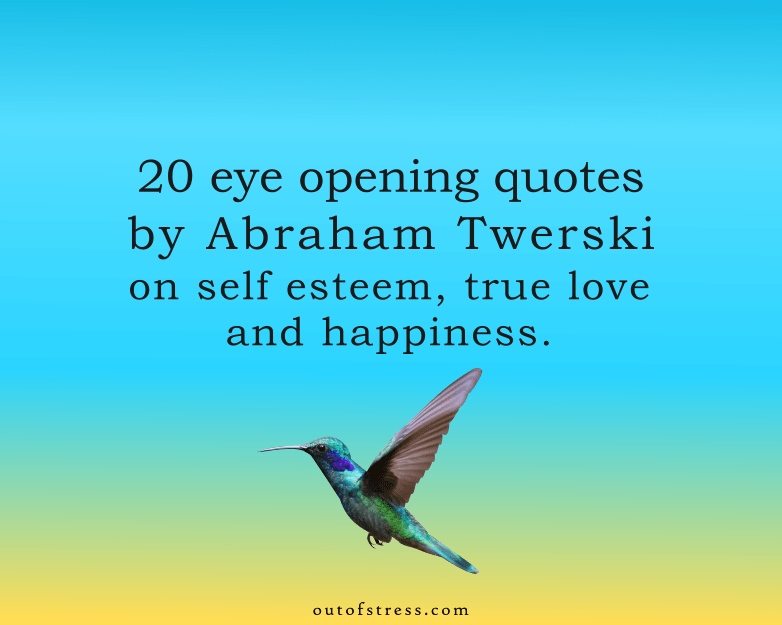
Abraham Twerski is an American Rabbi and a psychiatrist who has written over 60 books most of them in the category of self help. The focus of his self help books are self awareness, self acceptance, increasing self esteem and self love.
He has also written several books with Charles M. Schulz, the creator of peanuts (comic strips) and popular characters like Charlie Brown and Snoopy.
His bestselling books include ‘When do the good things start?’ and ‘Waking up just in time’ both of which feature illustrations from Charles M. Schulz.
Eye opening quotes from Abraham Twerski
This article is a collection of some really profound and eye opening quotes by Abraham Twerski on a variety of topics including self esteem, true love, happiness, emotions and more. These quotes have been presented with a little background information so you can understand them better.
1. Quote(s) on finding happiness
“Happiness is self fulfillment. If a person neglects fulfilling any capacity or trait that he has, there is an inherent feeling of unhappiness.” – Abraham Twerksi
“If we took the effort to realize, what we really are, the strength and the capacity that we have, the wonderful traits that we have, and develop them to the fullest, then we will be happy.” – Abraham Twerksi
Interpretation: According to Twerski, self awareness is the key to happiness. When you get to know and understand yourself in the deepest sense, you will realize what your true strengths and desires are which will help you attract the right people, the right circumstances and the right opportunities into your life leading to fulfillment and happiness.
(source)
2. Quote(s) on true love
“Love is not about what I am going to get, but what I am going to give. People make a mistake in thinking that you give to those whom you love, the real answer is, you love those to whom you give.” – Abraham Twerski
“True love is a love of giving, not a love of receiving.” – Abraham Twerski
Interpretation: True love does not focus on what it can receive from the other. True love focuses on giving as you do not consider the other person as separate from you. So you give to the other, like you give to yourself.
(source)
3. Quote(s) On low self esteem and its associated problems
“Low self esteem means that a person is unaware, of one’s strengths and abilities and hence underestimates oneself.” – Abraham Twerski
“The majority of psychological problems that people have (adjustment problems, family problems etc.), can be traced to one basic problem and that is – a low self esteem.” – Abraham Twerski
“Low self esteem is a delusion, and it can cause people to have many maladjustments in life.” – Abraham Twerski
Interpretation: Twerski himself suffered from low self esteem which he says made him extremely sensitive to criticism. Even minor criticism would reinforce in him feelings of inadequacy and inferiority and send him into a depressive streak that lasted for many weeks.
He would do anything and everything he could to avoid criticism and in the process became a people pleaser. This is because of his belief that there was no reason for people to like him and that if people actually knew him they would reject him.
All of these beliefs and feelings were operating in him without his conscious knowledge. Once Twerski become aware of these limiting beliefs, he went on a life transforming self awareness journey that helped him let go of low self esteem.
(source)
4. Quote(s) On finding out if you have a low self esteem
“Sit in a quiet room, close your eyes and breath. See how long it is before you have to get up and do something. If you got a good self esteem, you should be able to sit comfortably, doing nothing (not falling asleep) and relaxed for 10 minutes.” – Abraham Twerski
Interpretation: Even though he was extremely successful, Twerski suffered from extreme self esteem issues which he was actually unaware of till the age of 38.
The problem showed itself when he was vacationing in Hot Springs, Arkansas and was asked to spend 25 minutes alone in a hot tub as part of a health program. Even though it was a deeply relaxing experience, Twerski soon started to feel uncomfortable after the first five minutes. The remaining minutes as he recalls were agonizing.
Upon returning from the vacation, Twerski tried to figure out why he felt this way. He consulted with a psychologist friend who helped him figure out the real issue.
The problem was that being in that hot tub with absolutely no diversions (no T.V., no one to talk to or listen to) meant that one comes into an immediate intimate company of oneself. And if you don’t like yourself very much, you will start feeling uncomfortable.
This came as a revelation to Twerski that there was something about himself that he did not like (as he was not comfortable being with himself) and he started to investigate this further by asking questions like ‘What is it that I think about myself?‘, ‘Is my self concept true?‘, ‘Why don’t I like myself?‘, which further took into a life transforming self awareness journey.
So take this test and find out for yourself if you have a healthy self esteem.
(source)
5. Quote(s) on the importance of having a healthy self esteem
“Building self esteem is necessary for happiness, you can’t really be happy in life, if you are delusional about yourself and you don’t think well of yourself.” – Abraham Twerski
“Self esteem means having an accurate, true, concept of oneself.” – Abraham Twerski
“Self esteem is tied into sense of responsibility. The more we are aware of our strengths and abilities, the greater we have the obligation to fulfill them.” – Abraham Twerski
Interpretation: Twerski believes that a healthy self esteem is absolutely essential for a happy life. This is because, you don’t know yourself and your concept of yourself is flawed, you will automatically attract things into your reality that are not in alignment with your true nature.
Instead, when you start to become aware of yourself, know what your real strengths and abilities are, you can then let go of all the limiting beliefs and ideologies that you accumulated over the years and start to bring your life in alignment with your true desires. This is the beginning of a fulfilling life which leads to being happy.
(source)
6. Quote(s) on the difference between being humble and having a low self esteem
“Low self esteem is not humility, low self esteem is a delusion and is not a desirable trait whereas humility is a desirable trait.”
“Humility means, knowing the truth about oneself, knowing one’s strengths and abilities but not thinking that therefore that makes me a more worthy person than someone else.” – Abraham Twerski
“Humility means, I do everything I can, I exercise my strength, but I still respect other people and I don’t put myself above them.” – Abraham Twerski
“You can’t really be humble if you don’t have good self esteem.” – Abraham Twerski
Interpretation: As Twerski points out, there is a huge difference between someone who has a low self esteem and someone who is humble. A humble person knows his value but doesn’t consider himself to be above anyone else in an egoic manner. A person with low self esteem on the other hand, does not know his value and considers others to be of higher value than him.
So it is clear that only someone with a healthy self esteem can actually be humble. You can only be humble when you know yourself, because in knowing yourself, you know others. In knowing yourself, you become empathetic and hence humble.
(source)
7. Quote(s) on the difference between empathy and sympathy
“Feeling for somebody else is sympathy but empathy means to be able to see things from the other person’s perspective.” – Abraham Twerski
Interpretation: There is a lot of difference between empathy and sympathy. Sympathy is simply feeling sorry for someone and anyone can do that. Sympathy does not solve anything. In most cases, people don’t even want your sympathy. But empathy is a notch above. Empathy is the ability put yourself in the other person’s place and then look at life or a situation from their perspective.
Twersky explains empathy using a beautiful story. There was once a Rabbi who used to listen to people’s problems and give them advice. One morning when he was listening to his supplicants, the Rabbi’s aid noticed that he was sweating profusely. Upon asking the reason, the Rabbi told the aid that when someone comes and tells him their problems, in order for him to help them, he has to feel their problem. He has to take off his clothes and put on their clothes. Now that he understands their problem, he has to take off their clothes and wear his clothes again so he can look at the problem objectively and give them advice. The reason he was sweating so profusely was because he had been doing that (taking off and wearing clothes over and over again) all morning!
So that’s what empathy is. The ability to deeply understand the other person (or put on his clothes as in the story). And this is why, empathy is an extremely powerful trait to possess. It is also the key to successful relationships.
(source)
8. Quote(s) on the difference between relaxation and diversion
“Relaxation is not doing. Relaxation is an absence of doing. What people are generally referring to when they say relaxation are diversions not relaxation.” – Abraham Twerski
“In no way does that mean that diversion is bad. We all need some kind of entertainment, that’s a healthy need. But it is not relaxation and I think a person should be able to do both.” – Abraham Twerski
Interpretation: As Twerski rightly points out, many people confuse relaxation with diversion. But they are not they same.
A diversion is any activity that helps you refocus your attention from a stressful work or life situation to something more pleasant and fun. Like for example, playing golf.
Relaxation on the other hand is the art of doing nothing and simply being in your own company. When relaxing, you are not engaged in a thought about the past or future, instead, you are fully in the present moment, fully conscious of your relaxation experience. You are simply ‘being’, relaxed and still.
(source)
9. Quote(s) on the value of stress
“Times of stress are also times that are signals for growth and if we use adversity properly, we can grow through adversity.” – Abraham Twerski
Interpretation: If you look back at all the difficult times in your life, you will realize that they help you learn valuable life lessons. Without them, you would have stayed stagnant without any inner growth.
Twerski explains this point beautifully by giving the example of the lobster and how it grows.
The lobster is a soft, mushy animal that protects itself by living inside a rigid shell. The problem is that the rigid shell does not expand. So as the lobster grow bigger that shell starts to feel really confining and uncomfortable. In order to deal with this situation, the lobster has to hide beneath a rock formation (for protection from predators), cast off its old shell and produce a new one. Eventually, the new shell becomes confining too and hence the entire process is repeated.
Now if you think about it, say for instance, the lobster were to go to a doctor and gets prescribed a medicine to not feel uncomfortable, it will never grow.
Therefore, as Twerski puts it, ‘the stimulus for the lobster to be able to grow is that it feels uncomfortable’. It’s when we feel uncomfortable do we have a need to take action and in taking action we grow.
(Source)
10. Quote(s) on the nature of jealousy
“Jealousy means I am envious of that other person for what he has. When you are envious of somebody, it comes in a package. You want what the other guy’s got, it comes in a package.” – Abraham Twerski
Interpretation: When you are jealous of the other, you only see one facet of their life. There is a lot of hidden factors that you are unaware of. This is because, no one has got it all, everyone comes with a fair share of issues and opportunities. Even the billionaires who seem to be living the life on the outside have their own issues to deal with on the inside. Something that you can never realize unless you are in their shoes.
Twerski explains this point using a real life story that took place in the 1930’s. There were two friends who grew up together. One ends up owning a huge laundry chain and another becomes a grocery vendor. The laundryman is extremely wealthy but suffers from an extreme case of stomach ulcers (for which they did not have a cure in those days). This restricts him from eating anything but milk and crackers. One day, they both meet by chance and the laundryman asks his friend how he is doing. The vendor shakes his head and says, “not too good; I have to get up at 4 in the morning to go to the market to get groceries, and then I have to stand on my feet till 9 o’clock in the night, and all I earn is only enough for me to eat rye bread with radish“. To which the businessman replies, “you are fool, you don’t know what you have, if I could eat rye bread with radish, I would give you all of my laundries!”
So instead of looking at the other, shift your focus to looking within to realize your own strengths and abilities. Once you realize that, you will never feel jealous of the other.
(Source)
11. Quote(s) on the value of empathy in parenting
“Empathy is important in every relationship including parents and children. If parents operate with an adult mind, they have no way of knowing, what a child feels like. To be able to empathize with a child is extremely important in parenting.” – Abraham Twerski
Interpretation: As a parent it’s extremely important for you to develop empathy toward your children. When dealing with a child (for example, disciplining a child), you need to put yourself in place of the child and think from their perspective instead of thinking using an adult mind.
12. Quote(s) on having the right perspective
“A healthy perspective of reality can enable a person to overcome even the most difficult or troubled times.” – Abraham Twerski
Interpretation: We have to realize that sometimes our vision and perception is distorted and we see things that aren’t necessarily true.
You can either see the glass half full or half empty. It’s all a matter of perspective.
It is prudent that we broaden our vision and analyze and look at a situation from all possible perspectives instead of focusing on single element.
For example, the night is dark, but instead of focusing on the darkness, a simple change in our angle of vision helps us see all the stars above. The stars were always there, just that we did not see them before because our focus was in the wrong place.
In a similar way, you have to realize that you have control over your mind and that you can exercise that control to broaden your perspectives. When you do that, you are in an empowering position to overcome the most troubled times. All that is required is a change in perspective.
(source)







